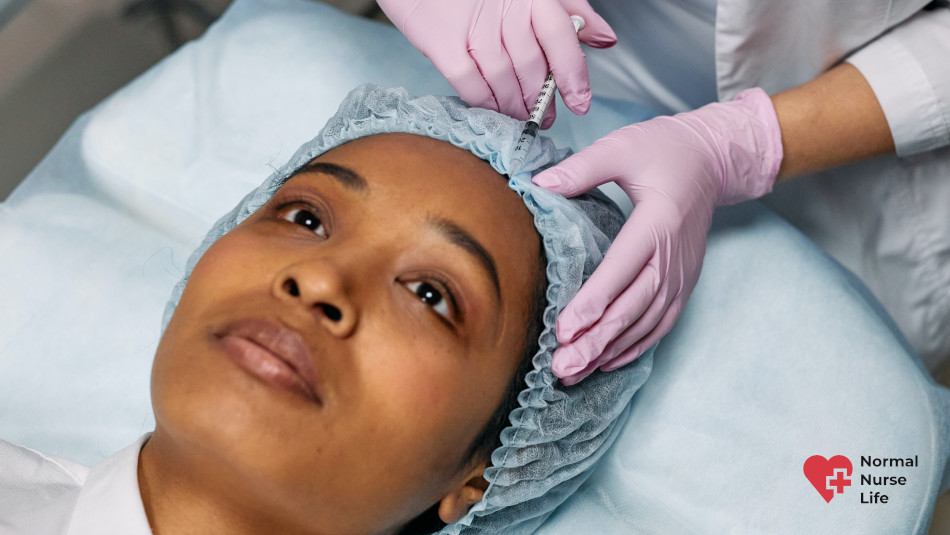Having completed your training in aesthetic nursing, you have taken on a new challenge that will require a lot of hard work and dedication in order to become an accomplished practitioner.
With so many aesthetic nurses fighting for the same jobs, you must be prepared for the aesthetic nurse interview questions before you attend your interview.
The first step in preparation is to familiarise yourself with the role and responsibilities of an aesthetic nurse.
Having a good understanding of the job will help you answer many of the common aesthetic nurse interview questions.
Aesthetic nurse responsibilities:
The aesthetic nurse has the responsibility of administering the skincare treatments.
You are accountable for purchasing, monitoring usage, and verifying that all treatments are handled and stored according to the guidelines.
You must also get involved with the recovery part of facial aesthetics, which means educating patients on aftercare.
Aesthetic nurses who work in a clinic tend to spend more time administering treatments than taking care of administrative issues such as stock ordering and dealing with patient requests.
As an aesthetic nurse, you will also be expected to work closely with the rest of the cosmetic team by participating in consultations and post-treatment care.
To answer questions regarding your experience, it is important that you have a good understanding of the procedures – whether they are chemical peels or laser treatments.
You also need to know how long each treatment lasts before it needs to be repeated, and what effects can be expected.
Pin me on Pinterest!

Table of Contents
The Most Common Aesthetic Nurse Interview Questions and Answers
1. How do you know if the client’s skin is suitable for treatment?
2. What is the difference between medical and paramedical aesthetics?
3. What are your responsibilities as an aesthetic nurse?
4. What experience do you have with laser treatments?
5. How long do the results of laser procedures last?
6. How would you talk to a client about skin cancer in order to convince them to visit a doctor?
7. Do you have a good understanding of the aftercare following cosmetic treatments?
8. What equipment would you use to perform a medical-grade chemical peel or microdermabrasion treatment?
9. How often should a patient receive a follow-up appointment for aesthetic services?
10. What are the benefits of micro-needling?
See also: Dermatology Nurse Interview Questions
1. How do you know if the client’s skin is suitable for treatment?
When asked this question, the interviewer will be looking for a well-informed response in which you combine theoretical knowledge with practical experience.
This is an opportunity to show the interviewer that you can manage difficult situations and approach new challenges.
There are a number of factors that influence the suitability of a client’s skin for treatment, such as skin color and medication.
You need to be clear about what treatments you would offer, and which ones might not be suitable for that particular client.
See also: Nursing Care Plan for DVT
2. What is the difference between medical and paramedical aesthetics?
The interviewer wants to hear that you are aware of the different specialties within aesthetic Nursing and that you understand where the boundaries lie.
You should be able to identify when it is appropriate for an aesthetic nurse to act on behalf of a doctor.
A paramedical aesthetic nurse administers treatments that are designed to improve the appearance of their client, but they do not deal with any condition or illness.
An example of treatment might be Botox injections to reduce wrinkles.
A medical aesthetic nurse has the same responsibilities as a paramedical aesthetic nurse, however, they have received additional training in the diagnosis and treatment of skin conditions, prescribing medications, performing injections for filling fine lines and wrinkles, administering chemical peels, microdermabrasion, or laser therapies.
See also:
3. What are your responsibilities as an aesthetic nurse?
Answering this question correctly involves demonstrating you understand both the administrative side of aesthetic nursing as well as the clinical side.
In addition to administering aesthetic treatments, one of the most important responsibilities for an aesthetic nurse is to impart sound advice about aftercare.
When a client leaves your clinic, they will be provided with information about how best to care for their skin and what results they can expect from the treatment.
See also: Responsibility of a Nurse
4. What experience do you have with laser treatments?
The scope of practice for an aesthetic nurse includes the administration of laser and IPL treatments, so you must be aware of how these work and what equipment is necessary to perform them.
Laser treatment works by sending beams of light down onto the skin, which has a specific effect depending on which type of laser is used such as spot resurfacing or fractional.
Lasers work best when the skin is deeply cleansed to ensure that the beam of light can reach all areas and remove dead or damaged tissue.
An IPL emits a different wavelength of light than a laser does, so it works by transmitting energy into the skin at a shallow depth and removing pigmentation by selective absorption.
Any aesthetic nurse looking to become a laser practitioner should complete a course in laser technology and hold the appropriate accreditation.
5. How long do the results of laser procedures last?
There are a number of factors involved in determining how long the effects of a laser procedure will last.
The interviewer is interested in your awareness of these factors and the way they impact the outcome of treatment, such as skin type and color.
It depends on the depth to which the laser penetrates into the dermis layer of skin.
Deep lasers result in longer-lasting results of up to five years, whereas superficial lasers have a slightly shorter duration of between one and three years.
See also: Nursing Interview Questions and Answers
6. How would you talk to a client about skin cancer in order to convince them to visit a doctor?
This question is designed to gauge how you approach potentially sensitive topics and whether or not you are prepared to put yourself in the client’s shoes.
As well as demonstrating your empathy, you must also avoid scaring them off!
See also: Compassion in Nursing
Skin cancer is a serious topic but it should be approached delicately, with the patient’s best interest at heart.
It is important to stay calm and reassure the client that you understand their fears before explaining why they should visit a doctor.
You want to make it clear that choosing not to do so is a choice they can make but will leave them with unresolved worries and possible future problems.
See also: Dental Nurse Interview Questions
7. Do you have a good understanding of the aftercare following cosmetic treatments?
Answering this question correctly will demonstrate you know how best to care for the skin before and after treatment.
Aesthetic nurses must be able to answer any queries clients may have about what they should do with their makeup, creams, and advice on sun exposure following a non-ablative procedure.
The most important thing to remember is that the skin must stay well hydrated so you should recommend a good moisturizer following any procedure.
Antioxidants are also very important as they help protect the skin from environmental damage, so continue to encourage clients to take vitamin supplements or eat lots of fresh fruit and vegetables.
See also: Plastic Surgery Nurse Interview Questions
8. What equipment would you use to perform a medical-grade chemical peel or microdermabrasion treatment?
This question is designed to see whether you know what equipment would be used for different procedures.
Aesthetic nurses must have a full understanding of the machinery involved in popular treatment methods, such as lasers and IPLs, so they can advise clients on their suitability.
For a medical-grade chemical peel, you would use an acid solution applied with a gauze pad, whereas for microdermabrasion you would use either an abrasive brush or diamond-tipped wand.
See also: Interventional Radiology Nurse Interview Questions
9. How often should a patient receive a follow-up appointment for aesthetic services?
Answering this successfully will demonstrate you are aware of the importance of aftercare, as well as how best to encourage clients to speed up their recovery times.
Interviewers may ask how soon a follow-up appointment should take place following certain procedures such as dermal fillers or laser treatments.
Aesthetic nurses agree that it is ideal for clients to book a follow-up appointment at six weeks.
This allows you to check up on their healing progress and also fits in perfectly with the suggested timetable for cosmetic treatments, which typically take three months.
See also: LPN Interview Questions
10. What are the benefits of micro-needling?
Interviewers will want to know if you understand how various treatments work, what their associated risks are, and whether or not they are suitable for clients with certain skin types.
For example, many patients prefer Fraxel laser over micro-needling because it does not leave any redness or downtime.
Microneedling can help improve pigmentation by stimulating the production of collagen, as well as reducing wrinkles and scars.
The associated risks are minimal side effects, such as post-inflammatory hyperpigmentation or temporary redness, which usually subside within seven days.
This method is safe for any skin type, however, it should not be used on oily or acne-prone skin types.
See also: How to Get Over Fear of Needles as a Nurse
Conclusion: Interview Questions for Aesthetic Nurses
The best way to approach the interview is to show that you are a safe pair of hands-on which clients can rely upon.
A good aesthetic nurse will listen carefully to their needs and advise them with the information they need in a calm and reassuring tone of voice.
You must also be able to provide all patients with a full aftercare plan to ensure they return to their normal activities as soon as possible.
Related articles of ours:
- Endoscopy Nurse Interview Questions
- Travel Nurse Interview Questions
- Orthopedic Nurse Interview Questions
- Interview Questions for Hospice Nurses
- Interview Questions for Certified Nurse Assistant
- Wound Care Nurse Interview Questions
I’d be glad if you could give this article a star rating down below. Thank you in advance!
